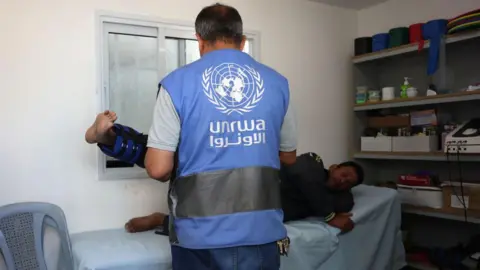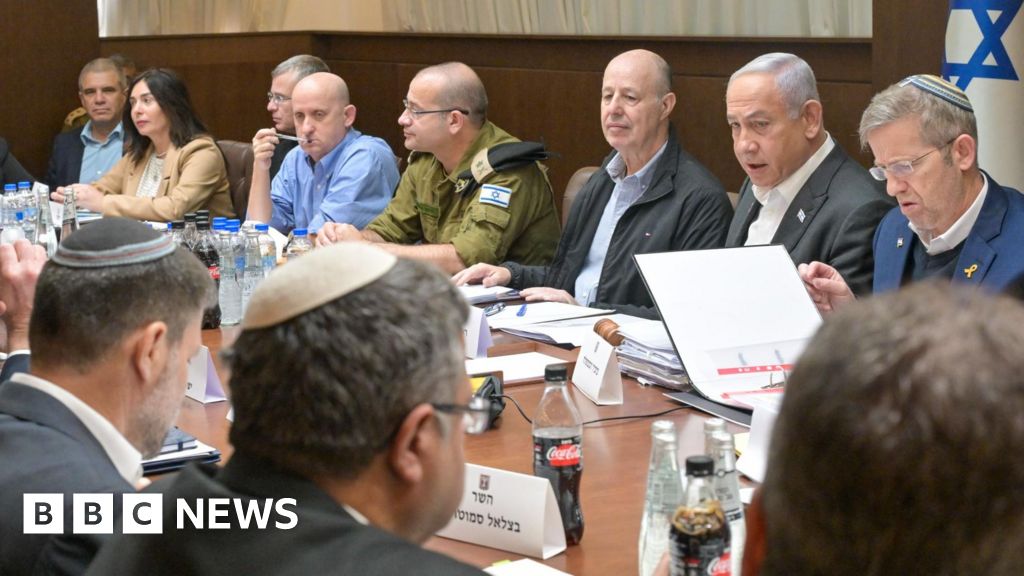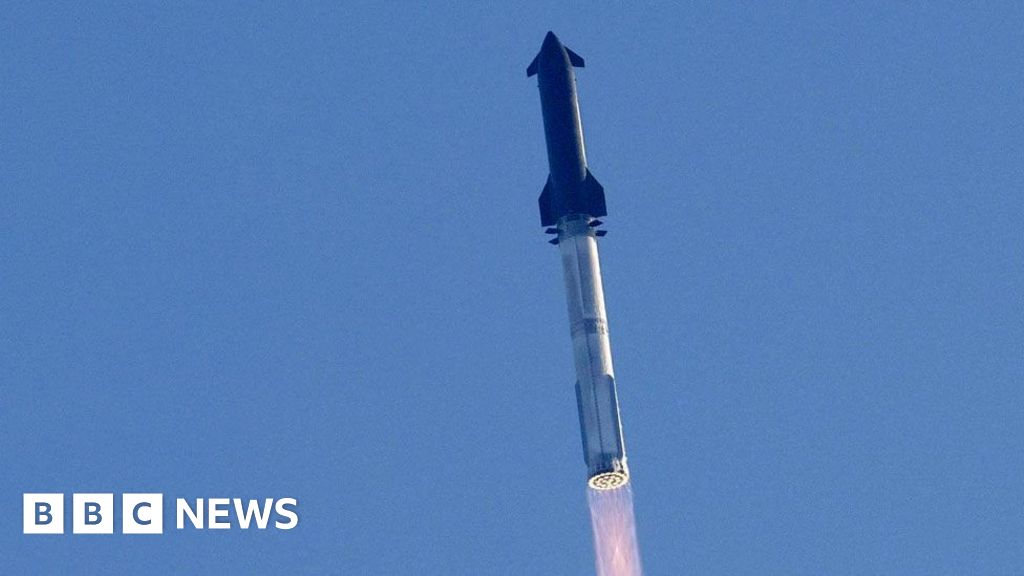ARTICLE AD BOX

 Getty Images
Getty Images
Israel's parliament voted on Monday evening to ban the UN's Palestinian refugee agency (Unrwa) from operating within Israel and occupied East Jerusalem.
Contact between Unrwa employees and Israeli officials will be banned, crippling its ability to operate in Gaza and the Israeli-occupied West Bank.
Almost all of Gaza's population of more than two million people are dependent on aid and services from the agency.
The move has faced widespread condemnation, with Unrwa warning the new law could see aid supply chains "fall apart" in the coming weeks.
Israel has defended the move, repeating its allegation that a number of the agency's staff were involved in Hamas's 7 October attacks last year, which killed 1,200 people.
However, Israel's opposition to Unrwa also goes back decades.
What is Unrwa and what does it do?
Founded in 1949, the Relief and Works Agency for Palestine Refugees, or Unrwa, works in Gaza, the West Bank, Syria, Lebanon and Jordan, initially caring for the 700,000 Palestinians who were forced from or fled their homes after the creation of the state of Israel.
Over the decades, Unrwa has grown to become the biggest UN agency operating in Gaza. It employs some 13,000 people there and is key to humanitarian efforts.
It is funded primarily by voluntary donations by UN member states, with the UN itself providing some direct funds.
It distributes aid and runs shelters and key infrastructure - such as medical facilities, teacher training centres and almost 300 primary schools.
Since the war in Gaza began, the agency says it has distributed food parcels to almost 1.9 million people. It has also offered nearly six million medical consultations across the enclave over the course of the conflict.
More than 200 Unrwa staff have been killed in Israeli attacks since October 2023 in the course of those duties, according to the agency.
Why are there tensions between Israel and Unrwa?
Unwra has long been criticised by Israel, with many there objecting to its very existence.
The fate of refugees has been a core issue in the Arab-Israeli conflict, with Palestinians harbouring a dream of returning to homes in historic Palestine, parts of which are now in Israel.
Israel rejects their claim and criticises the set-up of Unrwa for allowing refugee status to be inherited by successive generations.
It says this entrenches Palestinians as refugees, and encourages their hopes of a right of return.
The Israeli government has also long denounced the agency's teaching and textbooks for, in its view, perpetuating anti-Israel views.
In 2022, an Israeli watchdog said Unrwa educational material taught students that Israel was attempting to "erase Palestinian identity”.
The European Commission identified what it called "anti-Semitic material" in the schoolbooks, "including even incitement to violence", and the European Parliament has called repeatedly for EU funding to the Palestinian Authority to be conditional on removing such content.
Unrwa has previously said reports about its educational material were "inaccurate and misleading" and that many of the books in question were not used in its schools.
Why has the Knesset banned Unrwa now?
After the 7 October Hamas attacks on Israel, allegations that some Unrwa staff were involved further amplified calls in Israel for the agency to be banned.
The military claimed that in total, more than 450 Unrwa staff were members of "terrorist organisations". In the wake of the allegations, some 16 Western countries temporarily suspended funding for the aid agency.
The UN investigated Israel’s claim and fired nine people, but it said Israel had not provided evidence for more allegations and Unrwa denied any wider involvement with Hamas.
Speaking on Monday night, Prime Minister Benjamin Netanyahu repeated the allegations, writing on X that "Unrwa workers involved in terrorist activities against Israel must be held accountable."
Under the new law - which was approved by 92 MPs and opposed by just 10 - contact between Unrwa employees and Israeli officials will be banned.
What is the potential impact of the ban?
While most of Unrwa's projects take place in Gaza and the occupied West Bank, it relies on agreements with Israel to operate. This includes moving aid through checkpoints between Israel and Gaza.
Along with the Palestinian Red Crescent, Unrwa handles almost all aid distribution in Gaza through 11 centres across the enclave. It also provides services to 19 refugee camps in the West Bank.
Unrwa director William Deere told the BBC that on a practical level, the ban on interacting with Israeli officials meant it would become almost impossible for the agency's staff to operate in the country.
"We won't be able to move in Gaza without being subject to possible attack, international staff won't be able to get visas any longer," he said.
The executive director of the UN's World Food Programme said without Unrwa's presence in Gaza, aid agencies will be unable to distribute essential food and medicine.
"They do all the work on the ground there," Cindy McCain told the BBC. "We don't have the contacts. We don't have the ability to get to know the contacts, because things are so intensely difficulty there."

 2 months ago
16
2 months ago
16








 English (US) ·
English (US) ·